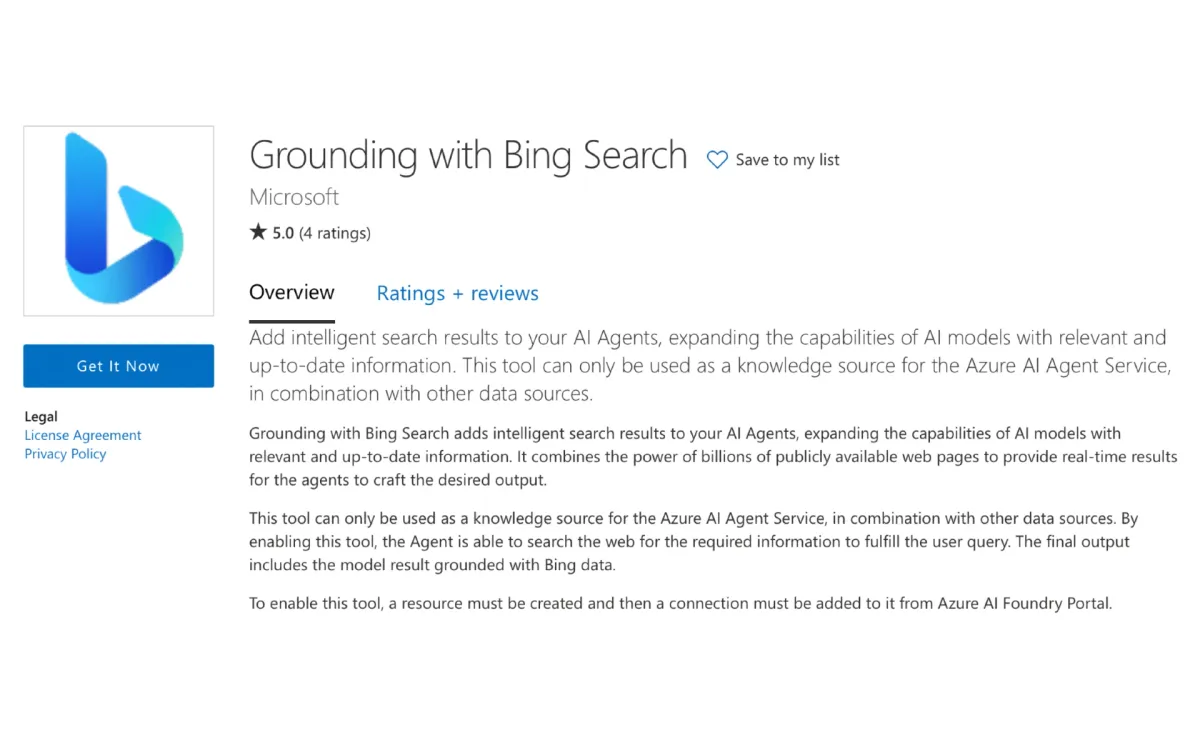
On January 31, 2023, Microsoft announced the integration of "Grounding with Bing Search" into its Azure AI Agent Service. This new feature allows developers to enhance the capabilities of large language models (LLMs) by incorporating real-time web data, addressing the temporal limitations inherent in static LLMs. According to Microsoft, this integration aims to improve the accuracy and relevance of AI-generated insights by leveraging up-to-date information from the web.
Large language models, while powerful, are limited by the data they were trained on, which is static and often outdated. "Grounding with Bing Search" bridges this gap by enabling AI agents to access the latest news, trends, and data points in real-time. This capability is particularly useful for applications requiring current information, such as market analysis, customer support, or travel updates. According to the announcement, this integration not only enhances the accuracy of AI responses but also ensures that the insights provided are timely and relevant.
The Azure AI Agent Service, which supports this new feature, is designed to help developers create sophisticated AI applications. These applications can sift through data, suggest solutions, and automate tasks. According to Microsoft, agents within the service can access multiple tools in parallel, including code interpreters and custom-built tools. They can also manage persistent threads, which store message history and automatically truncate conversations to fit within the model’s context window. This eliminates the need for developers to manually manage conversation states, a significant improvement over previous AI development practices.
The integration of "Grounding with Bing Search" is part of a broader effort to enhance the capabilities of AI agents. According to the Azure AI Agent Service documentation, agents can now access billions of publicly available web pages to provide real-time results. This feature is particularly useful for applications that require up-to-date information, such as customer support or market analysis. The service is available in several regions, including East US, France Central, and Japan East, and supports a variety of models, including GPT-4 and GPT-3.5 Turbo.
To use "Grounding with Bing Search," developers must create a resource and add a connection to it from the Azure AI Foundry Portal. According to the documentation, the tool can only be used as a knowledge source for the Azure AI Agent Service and must be combined with other data sources. Once enabled, the agent can search the web for the required information to fulfill user queries, with the final output grounded with Bing data.
The Azure AI Agent Service also includes quotas and limits to ensure efficient operation. According to the service documentation, the maximum file size for agents and fine-tuning is 512 MB, while the maximum size for all uploaded files is 100 GB. The token limit for agents is 2,000,000, and the maximum number of files per agent or thread is 10,000 when using the API or Azure AI Foundry portal. These limits are designed to ensure that the service can handle large-scale applications without compromising performance.
In addition to "Grounding with Bing Search," the Azure AI Agent Service supports a variety of other tools and features. According to the documentation, agents can access files in several formats, including images and spreadsheets, and can create files as part of their operations. The service also supports the use of existing Azure AI Search indexes, allowing developers to integrate their own data sources into the AI agent’s workflow. This feature is particularly useful for applications that require access to proprietary or specialized data.
The Azure AI Agent Service is built on the same capabilities that power Azure OpenAI's assistants. According to Microsoft, possible use cases for the service range from AI-powered product recommenders and sales analyst apps to coding assistants and employee Q&A chatbots. The service is designed to simplify the development of custom AI agents, which previously required significant effort even for experienced developers. By automating tasks such as conversation state management and tool integration, the service allows developers to focus on creating innovative AI applications.
The integration of "Grounding with Bing Search" into the Azure AI Agent Service represents a significant step forward in the development of AI applications. By enabling real-time access to web data, the service enhances the accuracy and relevance of AI-generated insights, making it a valuable tool for developers. According to Microsoft, this feature is just one of many enhancements planned for the Azure AI Agent Service, with more updates expected in the future.
The announcement of "Grounding with Bing Search" comes at a time when the demand for real-time data in AI applications is growing. According to industry analysts, the ability to access up-to-date information is becoming increasingly important for businesses looking to leverage AI for decision-making. The integration of real-time web data into the Azure AI Agent Service positions Microsoft as a key player in this space, offering developers a powerful tool for creating intelligent and responsive AI applications.
The integration of "Grounding with Bing Search" into the Azure AI Agent Service represents a significant advancement in AI development. By enabling real-time access to web data, the service enhances the accuracy and relevance of AI-generated insights, making it a valuable tool for developers. According to Microsoft, this feature is just one of many enhancements planned for the Azure AI Agent Service, with more updates expected in the future. As the demand for real-time data in AI applications continues to grow, the Azure AI Agent Service is well-positioned to meet the needs of developers and businesses alike.

